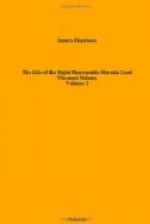In fact, on the 25th, the following curious advertisement, for a grand Te Deum, in consequence of this desirable event, was actually published at Naples; and the archbishop, with the rest of the clergy, solemnly assured the people, that great faith, and extraordinary prayers, had induced their saint to testify his entire approbation of the measure.
“All the faithful citizens of Naples are invited to be present this day, (Friday, the 25th of January 1799,) at two in the afternoon, at the celebration of Te Deum; which the archbishop, accompanied by the chapter, the clergy, the general in chief and staff of the army of Naples, will sing in the cathedral church, to thank the Most High for the glorious entry of the French troops into this city; and who, protected in a peculiar manner by Providence, have regenerated this people, and are come to establish and consolidate our happiness. St. Januarius, our protector, rejoices in their arrival. His blood miraculously liquified on the very evening of the entry of the republican troops.”
Lord Nelson, in the letter last mentioned, thus speaks of the state of Sicily—“As to this island, I cannot take upon me to say much: that they all hate the French, is certain; but, still, they feel themselves an oppressed people. On the 20th, at Augusta, a French vessel, with a hundred and forty officers and soldiers, arrived from Egypt. The boat people, and those of the town, attacked them. Eighty-seven were killed; the remainder escaped on board a Neapolitan frigate, who protected them. Sir William and Lady Hamilton, and I may add myself, are all unwell. The great queen is far from well. The king is the best of the party. As the queen is very anxious to hear of the fate of Tuscany, I shall direct Captain Louis—who, I was sure, your excellency would like—to send either Terpsichore, or this brig, back to Palermo.”
In a letter of the same date to Captain now Admiral Louis, his lordship says, observing that all in the house had been ill, and were still far from well—“The air of Palermo is very bad, in my opinion.” His confidence in Captain Louis, as well as in Mr. Windham, is thus strongly expressed—“You will, I am sure, my dear Sir, act in that way, which will always meet my wishes and do credit to our country. Whenever Mr. Windham tells you, that his Royal Highness the Grand Duke his no occasion for his majesty’s ships, I shall be very glad to see you here; but consult with Mr. Windham, and you cannot err.”
On the last day of January, Lord Nelson received, from England, official communications of the votes which had been passed by the House of Peers, the House of Commons, and the Irish House of Commons, conveying their thanks, by their respective speakers, to his lordship, his officers, and men, who fought in the battle off the Nile; which he instantly acknowledged, by most respectful answers to Lord Loughborough, the Right Honourable Henry Addington, and the Honourable John Foster.




